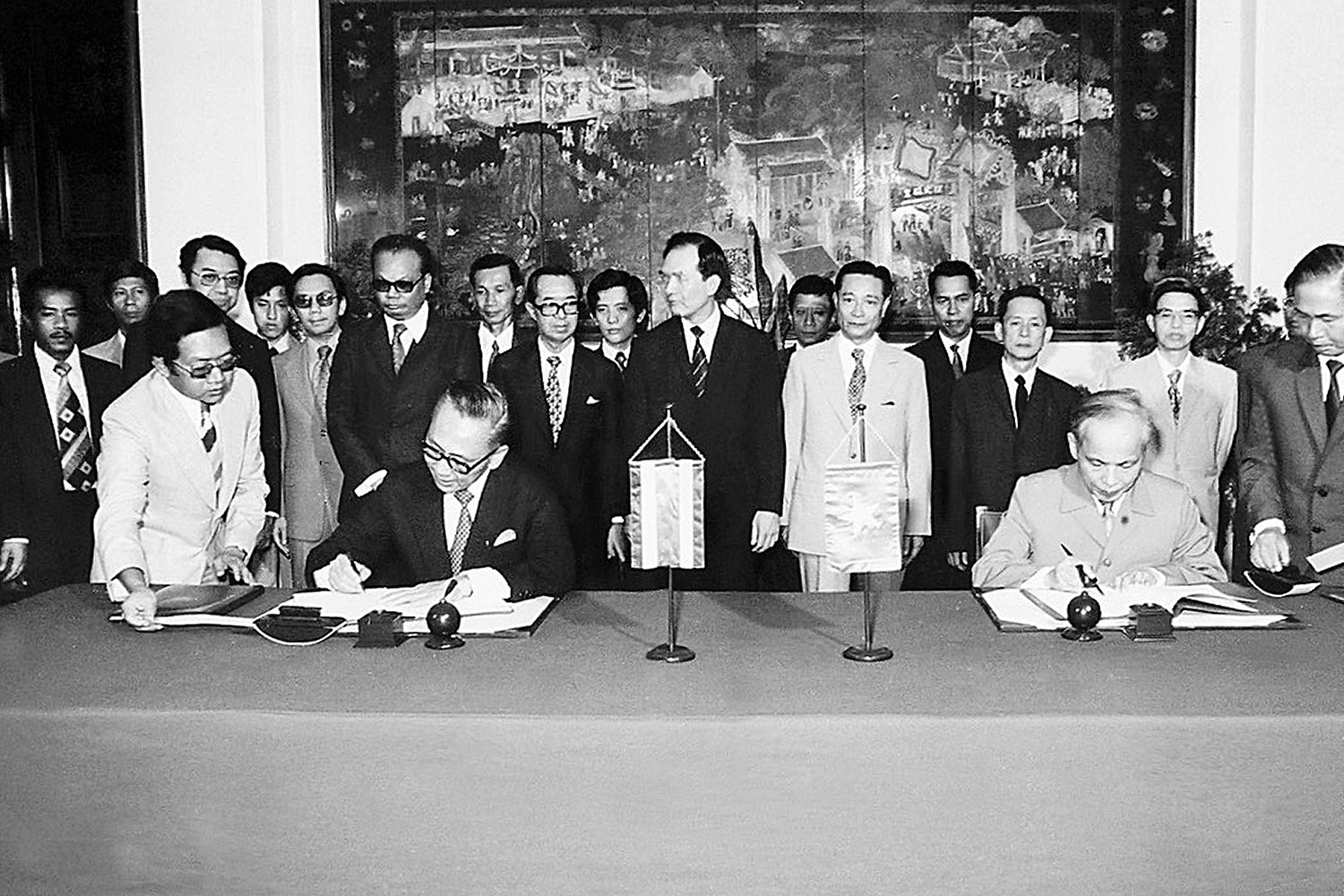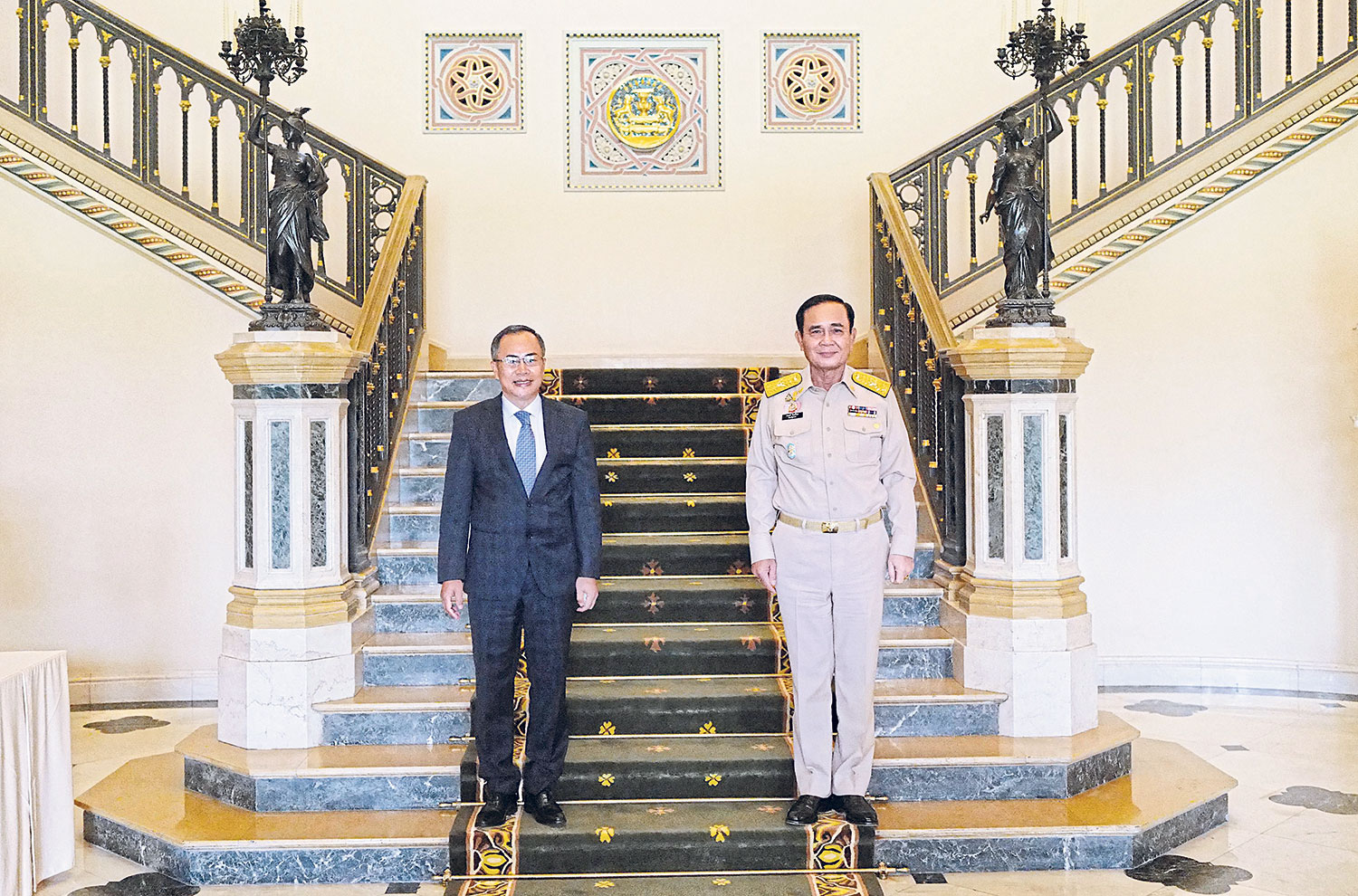On the auspicious occasion of the 76th National Day of Viet Nam, the Bangkok Post spoke to the Ambassador of Viet Nam to Thailand, H.E. Dr. Phan Chi Thanh.

President Ho Chi Minh (right) and Prime Minister of Thailand Pridi Banomyong in 1966
Can you highlight key achievements of Viet Nam during 76 years of its independence?
In 1945, the landslide victory of the August Revolution under the leadership of Ho Chi Minh led to the establishment of the Democratic Republic of Viet Nam on September 2, 1945, whose 76th anniversary the Vietnamese People is proudly celebrating this year. In these 76 years, the story of Viet Nam has been impressive to the world from the triumphs over the wars of resistance to the success of Doi Moi Reform making Viet Nam today become a strong, democratic, open nation and the fastest-growing economy in the world.
The national re-unification in 1975 marks the glorious end of national liberalisation struggle of the Vietnamese people in the North and the South. The transformation from a centralised backward agricultural economy facing constant food shortages to a leading exporter of agricultural products in the world, ensuring food security for the more than 97 million population, has been one of Viet Nam's greatest achievements. Graduated from low-income status in 2008, Viet Nam at present is among the 40 largest economies in the world and the 4th in ASEAN. Per-capita income has increased seventeen-fold to more than US$3,500, levelling Viet Nam with middle-income countries.
Viet Nam is among the world's fastest-developing countries in information technology (IT) with 70% of the population having access to the internet. The United Nations has classified Viet Nam as one of the countries reaching the Millennium Development Goals. In 2019, Viet Nam's Human Development Index (HDI) reached 0.704. This is a commendable achievement compared to countries at a similar level of development.

Former Minister of Foreign Affairs of Viet Nam, Nguyen Duy Trinh (right seated), and former Minister of Foreign Affairs of Thailand, Bhichai Rattakul (left seated), at the signing ceremony of the Joint Communiqué establishing diplomatic relations between Viet Nam and Thailand in Hanoi on August 6, 1976.
Given Viet Nam having been a poor and war-torn country, with devastated human lives, infrastructure, environment and diversity in terms of geography, language, religion, culture and ethnicity, the country's journey towards development and prosperity is an inspiring one. Political stability, openness, strong democratic institutions, a decentralised system of governance based on rule of law and the principle "of the people, by the people, for the people" have contributed to what Viet Nam's society is today.
Viet Nam's foreign policy built on independence, self-reliance, multilateralism, diversification, peace, friendship, cooperation and proactive integration, has "borne fruits". Viet Nam has joined ASEAN since 1995 and maintained robust relations with almost all the countries in the world and has 30 strategic partnerships and comprehensive partnerships; signed 17 free trade agreements, including comprehensive FTAs such as CPTPP, EVFTA and RCEP. Viet Nam recently became a non-permanent member of the UN Security Council and has joined the UN Peacekeeping Mission in Africa.
Can you explain more about Viet Nam's social development achievements?
Viet Nam has advocated the market eco-nomy model with socialist orientation since Doi Moi began in 1986, which equally combines both economic and social development targets and policies. This is to ensure that economic growth is accompanied by social progress and equality in every stage and policy throughout the development process. The poverty reduction is a key achievement of independent Viet Nam. As the result of decades combating poverty, the percentage of poor households fell by 1.5% every year on average, from 58% in 1993 to 5.8% in 2016, according to Government poverty standards, and to less than 3% in 2020, according to the multidimensional poverty index. While we are not yet able to provide free education at all levels for all, Viet Nam has realised the required primary education in 2000 and secondary education in 2010. The number of university and college students has increased by 17 times over the last 35 years. Currently, 95% of Vietnamese adults are literate. The poor, children under 6, and the elderly are provided with free health insurance coverage. Children malnutrition and infant mortality have been slashed about three-fold. Average life expectancy has gone up from 62 years in 1990 to 73.7 years in 2020. During the Covid-19 pandemic the government has provided large social support programmes to vulnerable groups, including free vaccinations to all residents and expats regardless of nationality or occupation.

Ambassador Phan Chi Thanh paid a courtesy call on Prime Minister Prayut Chan-o-cha on March 22, 2021.
This year, Thailand and Viet Nam commemorated the 45th Anniversary of diplomatic relations. Please describe the bilateral relationship between Viet Nam and Thailand?
Viet Nam and Thailand established diplomatic relations in August 1976, soon after Viet Nam's national reunification and the establishment of the Socialist Republic of Viet Nam. This year, we are celebrating the 45th anniversary of our diplomatic relations. The history of our bilateral ties date back nearly a millennium when the first Siam merchant ships approached the ports of Dai Viet in 1149 to exchange goods. Our contemporary relationship is enduring and multifaceted. There is a regular exchange of high-level visits, including official visits to Thailand of Secretaries General of the Communist Party of Viet Nam in 1993 and 2013, and the President in 1998.
Nobly, His Majesty King Maha Vajiralongkorn Phra Vajiraklaochaoyuhua visited Viet Nam twice as the Crown Prince of Thailand in 1992 and 1997. Her Royal Highness Princess Maha Chakri Sirindhorn has visited Viet Nam five times from 1993 to 2015. During the Covid-19 pandemic, the Prime Ministers and Presidents of National Assembly, the Foreign Ministers of the both sides maintain regular contacts through virtual meetings.
Viet Nam has enjoyed very good and fruitful relations with the Kingdom of Thailand. The two countries jointly carry out the Action Plan on implementing the Viet Nam-Thailand Strategic Partnership to vitalise comprehensive cooperation in all areas. Both sides are implementing more than 50 signed cooperation agreements in different areas. We have conducted regular consultations and shared common interest and understanding on a large number of bilateral and international issues. The governments have established strong and unique cooperation mechanisms. The 4th Joint Commission on Bilateral Cooperation (JCBC) chaired by the two Foreign Ministers is expected to meet virtually in October. The 4th Joint Cabinet Retreat (JCR) chaired by the two Prime Ministers will meet soon after the reopening of the two countries.
We also have a robust economic partnership and cooperation in defence and security, culture and education. Bilateral trade reached over US$16 billion in 2020 and has good potential to rise to US$25 billion in 2025. Viet Nam is home of over 600 projects with more than US$13 billion invested by Thai companies, ranking Thailand as the 9th largest foreign investor in Viet Nam. Notably, in development and technical cooperation, Thailand is assisting Viet Nam in implementing SEP models in two villages. The provinces cooperate with each other through 17 Sister City Agreements. P2P connectivity is vibrant through business, tourism, cultural and educational exchanges. More and more Thais are coming to Viet Nam to do business or study. Thousands of Vietnamese students have graduated from Thai universities and colleges. The large Thai Vietnamese community in Thailand acts as a friendship bridge between the two countries. Thailand was one of the largest source markets for Vietnamese tourism with over a million visitors in 2019.Viet Nam and Thailand are close partners in ASEAN, ACMECS as well as under cross regional mechanisms such as APEC, ASEM.
On this auspicious occasion, I would like to express my deep gratitude to the generations of leaders and people of the two countries who have built and nurtured the enduring friendship and cooperation between the two countries during the past 45 years. With the solid foundations built over the past 45 years, along with our potentials and strengths, I firmly believe that the strengthened strategic partnership between Viet Nam and Thailand will be further developed in ways that make the two countries become yet stronger together.
Embassy of Viet Nam
83/1 Wireless Road, Lumphini
Pathum Wan, Bangkok 10330
